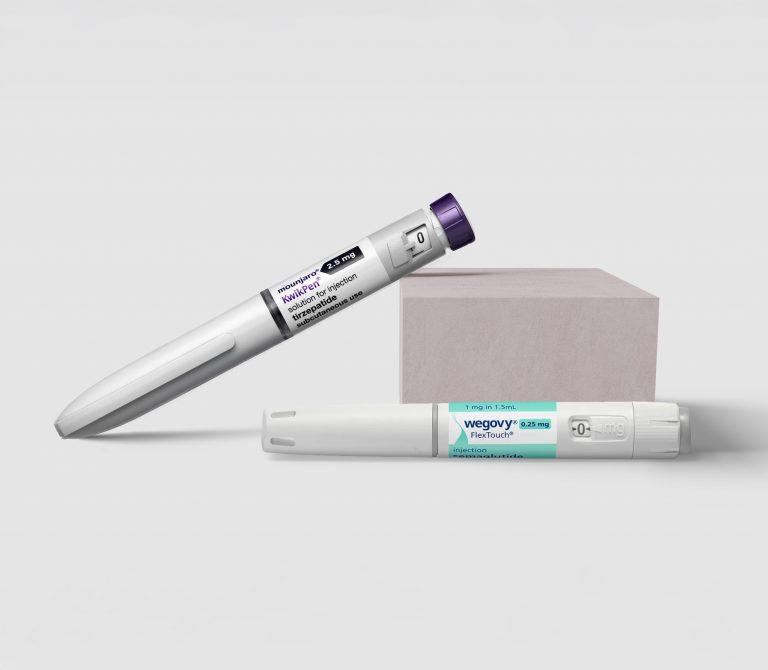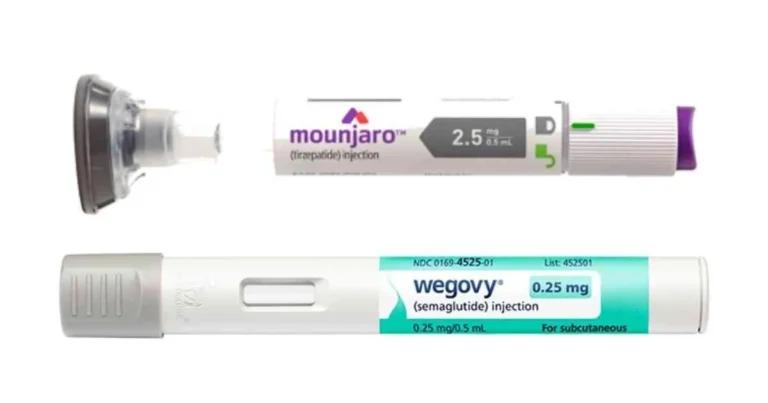In recent years, the surge in telemedicine has made it easier than ever to access prescription treatments, including weight‑loss injections, without leaving home. While convenience is appealing, not all online pharmacies are created equal.
In particular, services that screen customers via a simple online quiz may present significant safety risks compared to providers like NowPatient that conduct live, face‑to‑face video consultations with qualified healthcare professionals.
This blog explores why quiz‑only models fall short, how video consultations enhance safety, and practical tips for choosing a reputable online pharmacy for weight‑loss injections.

Image of patient seeing a NowPatient clinician over a live video feed
Introduction
Weight‑loss injections, such as GLP‑1 or GLP-1/GIP receptor agonists have revolutionized obesity management by suppressing appetite and improving blood sugar control. Major pharmaceutical companies like Novo Nordisk and Eli Lilly have played pivotal roles in educating and expanding the market for these medications, with key products including Novo Nordisk’s Wegovy and Eli Lilly‘s Mounjaro/Zepbound shaping the market. Increasingly, consumers are seeking convenient access to these medications to help them manage metabolic health and achieve long-term weight goals.
Traditionally administered under the supervision of a healthcare professional, these medications require careful assessment of:
- Medical history: To rule out contraindications (e.g., personal or family history of thyroid cancer, pancreatitis, or gallbladder disease).
- Current medications: To avoid harmful drug interactions and ensure the active ingredient is appropriate for the patient.
- Lifestyle factors: Ensuring the patient is a suitable candidate, can adhere to injection schedules and dietary recommendations, and is prepared for self-injections if needed.
- Health screenings: To determine eligibility for specific treatments and identify any underlying conditions that may affect the choice of medicine.
Doctors play a crucial role in overseeing treatments, guiding patients through self-injections, and monitoring for adverse reactions such as nausea, vomiting, diarrhea, or blood sugar fluctuations. Missing a dose for one week or switching medications without medical supervision can have significant consequences, so ongoing management and regular check-ins are essential for safety and effectiveness.
When these assessments happen in person or via video, clinicians can ask follow‑up questions, observe nonverbal cues, and clarify misunderstandings, critical steps for safe prescribing and ensuring the best outcomes for consumers seeking to lose weight at scale and at a reasonable price.
The Quiz‑Only Model: Convenience at a Cost
Some online pharmacies offer weight‑loss injections after customers complete a short multiple‑choice quiz. While this approach boasts rapid turnaround, often shipping medications the same day, it introduces several potential hazards:
- Superficial risk assessment. Quizzes typically limit answers to simplified checkboxes, failing to capture nuances of a patient’s health history. A question like “Do you have thyroid issues? Yes/No” doesn’t probe severity, duration, or prior test results. Quiz-only models often skip comprehensive health screenings, which are essential for safe prescribing.
- No opportunity for clarification. If a patient misunderstands a question or omits a detail (e.g., mild gallstones discovered incidentally), the pharmacy never learns about these critical factors.
- Automated decision‑making. Quiz responses feed into algorithms that may approve orders without human review. This mechanistic approach can’t replace the clinical judgment of a healthcare professional or manage patient care effectively.
- Lack of emergency planning. In the rare event of serious side effects, such as pancreatitis or allergic reactions, quiz‑only services aren’t set up to provide immediate medical advice or referrals.
Bottom Line: While quizzes are fast and simple, they sacrifice depth of assessment and patient safety, potentially exposing users to serious complications. In most cases, quiz-only models miss critical health information.
The Video‑Consultation Model: Prioritizing Patient Safety
By contrast, online pharmacies that base prescribing decisions on live video consultations offer multiple layers of protection through a telehealth platform:
- Interactive history‑taking. A clinician can explore past medical records, ask follow‑up questions, and clarify unclear or contradictory information.
- Visual assessment. Through video, practitioners can check injection techniques, review injection sites for signs of infection, and observe any physical indicators (e.g., rapid weight changes, bruising).
- Customized patient education. Real‑time conversations allow healthcare professionals to tailor instructions on dosing, storage, disposal of sharps, and dietary/lifestyle adjustments.
- Emergency protocols. Clinicians can schedule follow‑up calls, arrange for local care if complications arise, and ensure continuity of care with the patient’s primary physician.
- Regulatory compliance. Services that mandate video consultations are more likely to be registered with national regulators (e.g., the UK’s General Pharmaceutical Council or the US Food and Drug Administration) and adhere to telehealth standards.
Bottom Line: Although video consultations may require scheduling and slightly higher fees, they replicate the safety checks of in‑person care, making them a far more reliable option for prescription weight‑loss injections by supporting a comprehensive approach to weight loss care.
Key Questions to Ask Any Online Pharmacy
When considering an online provider for weight‑loss injections, vet them thoroughly:
- Do you require a live consultation?
A safe service should schedule real‑time video appointments with a qualified prescriber. - Who reviews my medical history?
Look for pharmacies that assign a specific clinician (e.g., a registered pharmacist or physician) to your case, not just an algorithm. - Are you registered with national regulators?
In the UK, check the General Pharmaceutical Council; in the US, verify FDA and state pharmacy board registrations. - What follow‑up support do you offer?
Ensure there’s a clear pathway for reporting side effects and getting additional guidance post‑prescription. - How is my data protected?
Confirm compliance with GDPR (Europe) or HIPAA (US) to safeguard your personal health information.
Practical Tips for Safe Online Purchases
- Seek evidence of genuine accreditation. Look for seals or registration numbers you can verify independently.
- Read patient reviews on independent platforms. Genuine testimonials often mention the consultation experience.
- Beware of “too good to be true” prices. Extremely low costs may signal a cut‑rate service that skips essential safety steps.
- Keep your doctor informed. Share any new prescriptions with your regular doctor to ensure continuity of care.
- Store and handle injections correctly. Always follow storage guidelines (e.g., refrigeration) and disposal protocols for needles.
Conclusion
While online weight‑loss injections offer unparalleled convenience, safety must never be compromised. Quiz‑only pharmacies may streamline the process, but they lack the nuanced clinical evaluation that live interaction provides.
If you’re considering online weight‑loss injections, look for providers who mirror NowPatient’s model:
- Mandatory video consultations with credentialed clinicians.
- Structured follow‑up and secure messaging.
- Verified regulatory registration.
By prioritizing a video‑first approach like NowPatient’s, you’re not just buying convenience, you’re investing in a safer, more effective treatment journey.
Medical Disclaimer
NowPatient has taken all reasonable steps to ensure that all material is factually accurate, complete, and current. However, the knowledge and experience of a qualified healthcare professional should always be sought after instead of using the information on this page. Before taking any drug, you should always speak to your doctor or another qualified healthcare provider.
The information provided here about medications is subject to change and is not meant to include all uses, precautions, warnings, directions, drug interactions, allergic reactions, or negative effects. The absence of warnings or other information for a particular medication does not imply that the medication or medication combination is appropriate for all patients or for all possible purposes.













